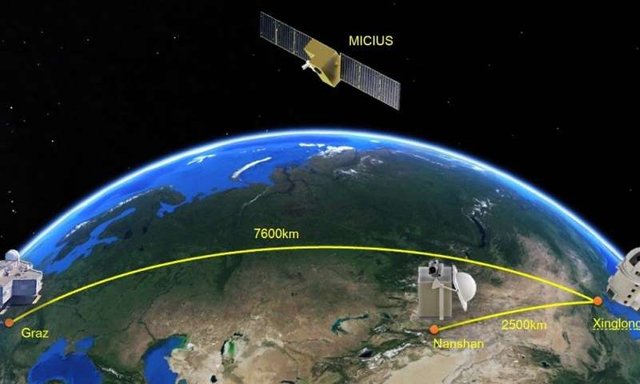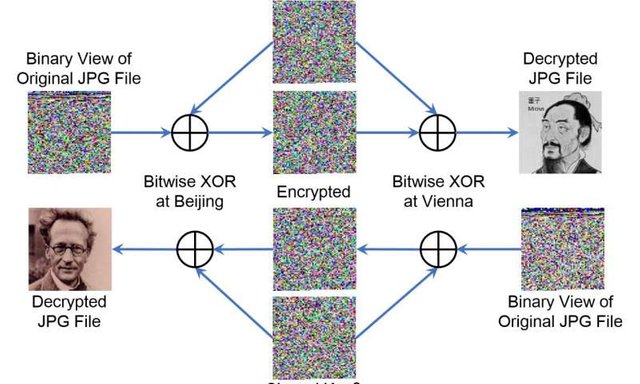China's "Quantum Sputnik" Paving The Way For A Global Space-Based Quantum Internet.

While the debates on quantum computing and the unprecedented security threat that it could eventually place on the blockchain platform are more familiar conversations in the worlds of quantum mechanics and computer science, a lesser known, but no less poignant development has quietly impacted both arenas'.
Launched in June of 2016, China's Micius satellite, developed by Chinese Academy of Science Professor Jian-Wei Pan as part of a platform for conducting quantum networking experiments, has put together an impressive resume' of quantum communications achievements.
One of the initial experiments involved two quantum processes: 1) creating entangled particles - two separate particles that share the same quantum state and 2) quantum teleportation - the ability to transfer quantum states of separate particles without the particles having to physically travel. Being that researchers can now create entangled particles on demand via a laser excited crystal, the researchers were able to conduct quantum teleporation from a ground station in Tibet to the Micius satellite with data transfers that were approximately 500 to 1,400 kilometers apart.
In another early experiment, the Micius satellite was commanded to produce a random string of numbers as an encryption key, which was then transfered to a ground station via entangled photon teleportation.
A complementary research team belonging to the same project was then able to use the prior gains made in quantum key distribution (QKD) to conduct similar experiments involving the Micius satellite and multiple ground stations.
As the quantum communications experiments progressed, the five ground stations in China that coordinate with the Micius satellite have become linked to fiber-based urban quantum networks. "For example, the Xinglong station has now been connected to the metropolitan multi-node quantum network in Beijing". The quantum communications "backbone is being tested for real-world applications by government, banks, securities and insurance companies."
In Fact, last June, the QKD tests became intercontinental, with Professor Jian-Wei Pan's quantum project teaming up Professor Anton Zelinger of Austrian Academy of Sciences to perform quantum key distribution between the Micuis satellite and three ground stations, two in China - Xinglong and Nanshan and one Austria - Graz. As detailed in the phys.org article "Real-world intercontinental quantum communications enabled by the Micius satellite":
"The satellite thus establishes a secure key between itself and, say, Xinglong, and another key between itself and, say, Graz. Then, upon request from the ground command stations, Micius acts as a trusted relay. It performs bitwise exclusive OR operations between the two keys and relays the result to one of the ground stations. That way, a secret key is created between China and Europe at locations separated by 7600 km on Earth. This work points towards an efficient solution for an ultra-long-distance global quantum network.
A picture of Micius (with a size of 5.34 kB) was transmitted from Beijing to Vienna, and a picture of Schrödinger (with a size of 4.9 kB) from Vienna to Beijing, using approximately 80 kbit secure quantum key for one-time-pad encoding."

Also part the experiment was a 75 minute long, quantum-secure intercontinental video conference held between the Chinese Academy of Sciences and the Austria Academy of Sciences using AES-128 protocol with a 128-bit per second refresh rate.
With such ground-breaking quantum communications achievements within such a short period of time, it is no wonder that the Micius satellite has been coined the "quantum sputnik".
Furthermore, being that the Chinese are no strangers to collaboration, it will be interesting to see if QKD work such as Rotom Arnon-Friedmans device-independent quantum cryptography and other quantum-based research are incorporated into their quantum internet program.
The Micius Satellite project has proven that "the Chinese researchers have moved to the forefront of quantum-based network communications and have demonstrated that the country's leaders are serious about implementing the first global quantum system over the course of the next decade."
Sources:
Real-world intercontinental quantum communications enabled by the Micius satellite
https://phys.org/news/2018-01-real-world-intercontinental-quantum-enabled-micius.html
Chinese team sends quantum keys to ground stations and teleports ground to satellite signals
https://phys.org/news/2017-08-chinese-team-quantum-keys-ground.html#nRlv
Physicists transmit data via Earth-to-space quantum entanglement
https://phys.org/news/2017-07-physicists-transmit-earth-to-space-quantum-entanglement.html#nRlv
Trust is good, quantum trickery is better
https://www.phys.ethz.ch/news-and-events/d-phys-news/2018/01/trust-is-good-quantum-trickery-is-better.html
Congratulations @allenbest! You received a personal award!
You can view your badges on your Steem Board and compare to others on the Steem Ranking
Vote for @Steemitboard as a witness to get one more award and increased upvotes!